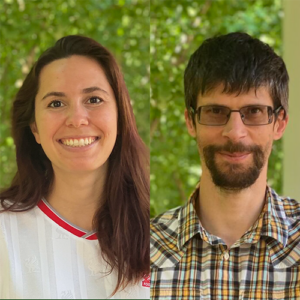
Andrea Merchak and Alban Gualtier, PhD
UVA Health neuroscientists have discovered a potential way to disrupt the chronic inflammation responsible for multiple sclerosis.
UVA’s new study identifies a vital contributor to the hyperactive autoimmune response and neuroinflammation that are the hallmarks of MS. Blocking this lynchpin in a research model of MS alleviated the harmful inflammation, giving researchers a prime target in their efforts to develop new treatments for multiple sclerosis and other autoimmune diseases.
The research was conducted by Andrea Merchak, a doctoral candidate in neuroscience, and her colleagues in the lab of Alban Gaultier, PhD, of the University of Virginia School of Medicine’s Department of Neuroscience and its Center for Brain Immunology and Glia (BIG).
“We are approaching the search for multiple sclerosis therapeutics from a new direction,” Merchak said. “By modulating the microbiome [the collection of microorganisms that naturally live inside us], we are making inroads in understanding how the immune response can end up out of control in autoimmunity. We can use this information to find early interventions.”
Read full press release in the UVA Health Newsroom.
